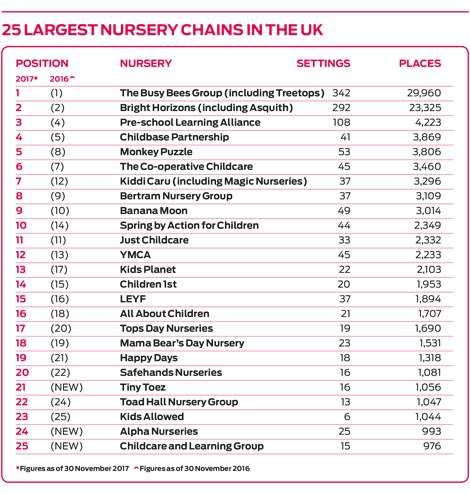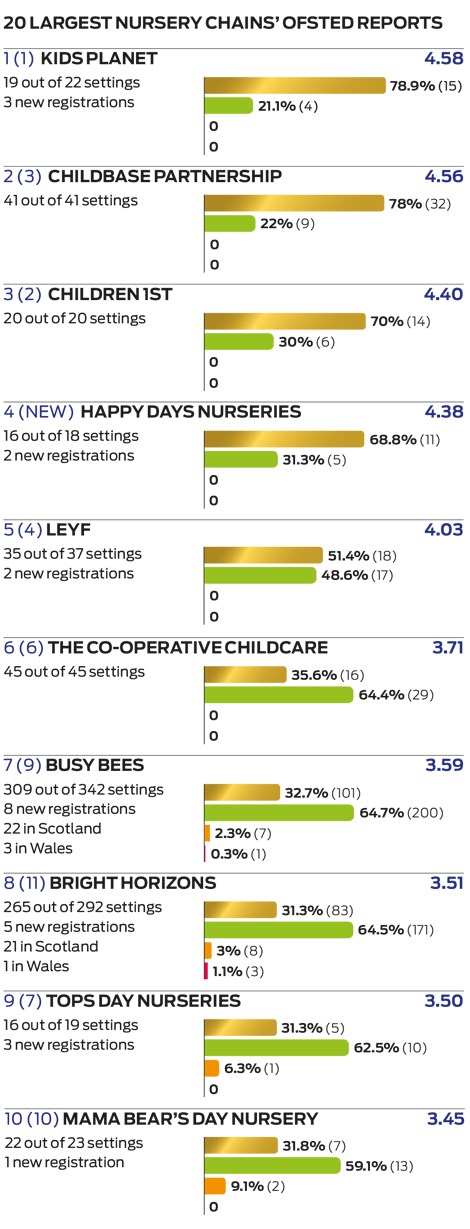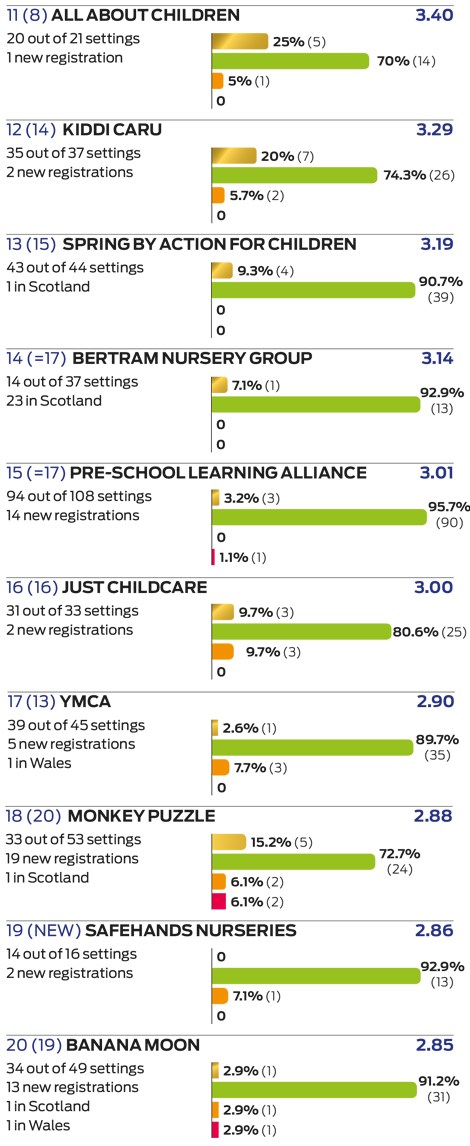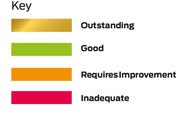Nursery Chains: League Tables - The big picture
Monday, November 13, 2017
The country’s two biggest chains have consolidated their positions at the top of the table after acquiring settings, which has enabled some new entries to sneak in, reports Catherine Gaunt

Just days after we went to press on our annual Nursery Chains supplement last year, Bright Horizons, the country’s second-biggest group, bought Asquith Nurseries, which had for many years been the third-biggest.
Thanks to the wonders of technology, we were able to produce an updated version of our top 25 league table on our website fairly swiftly. (But we are of course hoping that we won’t have a repeat of such an event this year!).
Our round-up of the largest nursery chains in the UK reflects this deal, with Bright Horizons cementing its place as the second-biggest group behind Busy Bees after adding 75 more nurseries and more than 5,600 places in the past 12 months.
Meanwhile, the largest nursery group secured the biggest deal of 2017 (so far) in March. This was Busy Bees’ acquisition of Treetops Nurseries, which this time last year was the sixth-biggest provider in the country with 58 settings.
Interestingly, this merger – alongside other smaller acquisitions – has led to Busy Bees growing in a very similar proportion to Bright Horizons, adding 74 nurseries and just over 5,700 places this year.

Meanwhile, Les Petits Chaperons Rouges (LPCR) – a pioneer of employer-sponsored childcare in France and the second-largest private nursery chain there – entered the UK market this year after buying the 16-strong Magic Nurseries group in January and Kiddi Caru’s 20 nurseries in September; a combined total of 3,200 places.
LPCR is the brand name of European family-owned provider Grandir, which also operates nurseries in Germany.
In an interview with Nursery World in September, LPCR’s chief executive Jean-Emmanuel Rodocanachi said that there were no plans to rebrand the Kiddi Caru or Magic Nurseries or make any changes to the UK nursery groups’ infrastructures.
There are also hints that there could be more UK deals in the pipeline for LPCR.
‘We have built a great growth story in France,’ said Mr Rodocanachi. ‘We came to a point where we had enough knowledge to go outside of the borders. The plan was to expand into [European] countries not impacted upon by the economic downturn. We realised countries that are the most populated – France, Germany and the UK – are the strongest economically. We want to operate nurseries in three countries only. Sometimes you have to do less to do well. Our obsession is quality.’
Meanwhile, Action for Children has recently rebranded its nursery operation to Spring by Action for Children. The children’s charity runs 44 nurseries around the country, nearly all of them previously part of 4Children. It also operates 249 children’s centres nationwide, provides support for children in care and young carers, and runs fostering and adoption services.
It is now the tenth-largest group in the UK, up from 14th place in last year’s table.
New entries
The consolidation in the top half of the table has allowed for three new entries to sneak into the bottom. Alpha Nurseries at number 24 has added seven more settings to its stock and is just shy of 1,000 childcare places. Tiny Toez at number 21 has taken on three more sites, and the Childcare and Learning Group in 25th place continues to operate 15 nurseries but has doubled the number of places at one of its Horley sites.
An analysis of the figures shows that this year’s top 25 groups offer a combined total of 103,369 places across 1,377 settings. This is an increase of 75 nurseries and 5,365 places on our 2016 league table. More than half of the nursery groups in this year’s table have increased the number of settings they operate in the past 12 months.
Our directory now contains the details of 180 nursery groups. This year we have 13 new members, including Kangaroo Pouch Nurseries in Oldbury, with seven nurseries; Little Forest Folk, with its growing group of five outdoor London nurseries; and Natural Choice, which operates across four sites and plans to expand with another 30 places in the new year.
Measuring quality
Our analysis of the Ofsted reports of the 20 largest nursery groups in terms of quality shows that Kids Planet has retained the top spot for the second year running.
Congratulations to the nursery group, which has 15 nurseries graded Outstanding and four graded Good.
It is worth noting that Childbase – last year in third – has only marginally missed out on first place. It is in second place because it has successfully converted nurseries previously graded Good to Outstanding status. The group now has 32 nurseries graded Outstanding, with the remaining nine graded Good.
The group has swapped places with Children 1st – last year’s runner-up – which is now in third place, with 14 of its nurseries graded Outstanding and six graded Good.
Happy Days Nurseries is a new entry in fourth place, with 11 Outstanding grades and five Goods.


*See below for notes on the table

The proportion of nurseries in the table graded Outstanding is just under a third (30 per cent), up from just over a quarter (25.4 per cent) last year. There are slightly fewer Good grades – 65.9 per cent, against 71 per cent last year. This is offset by a small rise in the nurseries graded ‘requires improvement’, which stands at 3.4 per cent. Just 0.6 per cent of nurseries have ‘inadequate’ grades.
Overall, our table highlights the strength of quality in the private and voluntary large group sector, with 96 per cent of nurseries graded either Outstanding or Good.
This is a slightly higher percentage than the figure for Ofsted’s most recent national statistics, which show that as of 31 March 2017, the proportion of childcare providers on the Early Years Register (EYR) judged to be Good or Outstanding was 93 per cent.
- Download the pdf Nursery Chains League Tables 2017
*NOTES ON TABLE
Compiled from the latest published Ofsted reports.
- The percentages given are based on the number of published Ofsted reports.
- We have only included nurseries registered and inspected by Ofsted, and excluded nurseries in Scotland, Wales, Northern Ireland and Ireland, which fall under different inspection regimes.
- We have noted where Ofsted reports are unavailable, for example if settings are new registrations.
- Where Ofsted says a newly registered setting has an associated provider, we have used the grade for that setting. Where there is a nursery at the same postcode that is not linked in this way by Ofsted, we have not used the grade, except where the chain itself explicitly links the two settings on its website.
Table rankings
We allocated points to each setting on the basis of its Ofsted report. For each group, the total number of points was then divided by the number of reports to give a final score. Figures in brackets show last year’s position.
Outstanding: 5 points
Good: 3 points
Requires improvement: 1 point
Inadequate: -2 points




